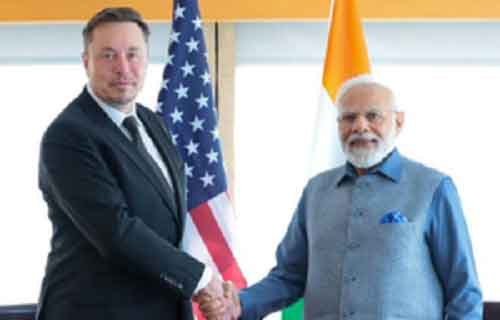
How Tesla can reach $3.6 billion in revenue from EV sales in India by 2030
New Delhi, April 11 – With Tesla and SpaceX CEO Elon Musk confirming his first-ever India visit to meet Prime Minister Narendra Modi later this month and announce key investments in the electric vehicle (EV) space, industry experts on Thursday said that the country could grow into a considerable market for him in the foreseeable future, generating at least $3.6 billion in revenue by 2030.
The news of Musk arriving here brought cheer to millions of Tesla lovers in India, after a determined PM Modi convinced the tech billionaire to look at the country — which has been witnessing stupendous economic growth across quarters for the past decade — as his next destination to build a Tesla plant and a global supply chain system.
According to experts, there’s a lot of history and talk about Musk’s intentions to enter the Indian market.
“The list of possible announcements includes India providing duty cuts on imported Tesla cars, the company establishing an official sales and service presence in the country, followed by possible manufacturing facilities further out,” senior analyst Soumen Mandal from Counterpoint Research told IANS.
The current EV penetration in India is 2.3 per cent, which is likely to reach 28 per cent by 2023.
The electric cars priced around $25,000 (Rs 20 lakh and above) will have at least a 15 per cent market share by 2030, according to the latest industry data.
“India could grow into a considerable market for Tesla in the long term. As cars effectively become supercomputers on wheels, we anticipate Tesla could achieve $3.6 billion in revenue from car sales in India alone by 2030,” Mandal noted.
Moreover, India has the potential to become a manufacturing hub for producing cars in the sub-$25,000 price range, with opportunities for export to developing and underdeveloped nations.
Additionally, said experts, Tesla’s preference for establishing its supercharger network could catalyse the growth of India’s EV charging infrastructure, mirroring the standardization seen with US automakers adopting the North American Charging Standard (NACS) charging standards.
Also known as the Tesla charging standard, NACS is an EV charging connector system developed by Tesla. It has been used by all Tesla vehicles in the US since 2021, and was opened for other EV automakers in November 2022.
According to Liz Lee, Associate Director at Counterpoint Research, the country’s EV landscape is about to see a significant rise.
“Government initiatives such as the production-linked incentive (PLI) scheme for Advanced Chemistry Cells (ACC) and the recent reduction in import duties on EVs under $35,000 to 15 per cent are game changers,” Lee said.
Meanwhile, car sales in India are likely to grow at a compound annual growth rate (CAGR) of 6.3 per cent between 2024-2030 from 4.4 million units last year.
According to industry experts, when it comes to EVs, the CAGR is expected to touch a staggering 52 per cent in the same time-frame — a “natural progression” for India as noted by Musk.
In 2024, India’s EV sales are likely to grow 66 per cent, driven by rising consumer interest, government initiatives, and infrastructure development.
Experts told IANS that Tesla’s presence in India could further stimulate the establishment of supply chain ecosystems, “leading to the localisation of automotive components manufacturing”.
It is a clear sign that India’s journey to “become a major player in the global EV market is accelerating,” they emphasised.